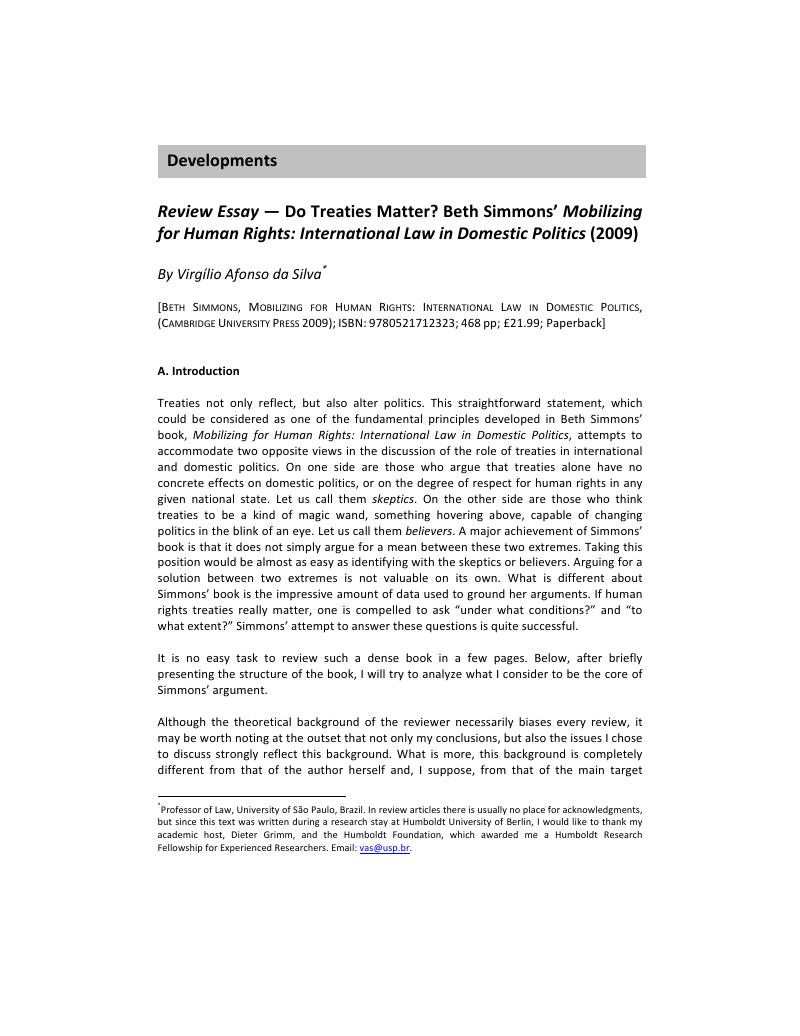No CrossRef data available.
Article contents
Review Essay — Do Treaties Matter? Beth Simmon's Mobilizing for Human Rights: International Law in Domestic Politics (2009)
Published online by Cambridge University Press: 06 March 2019
Abstract

- Type
- Developments
- Information
- Copyright
- Copyright © 2012 by German Law Journal GbR
References
1 See Bloodgood, Elizabeth, Book Review: Beth Simmons, Mobilizing for Human Rights, 125 Political Science Quarterly (PSQ) 521 (2010); David Cingranelli, Book Review: Beth Simmons, Mobilizing for Human Rights, 32 Human Rights Quarterly (HRQ) 761 (2010); Emilie M. Hafner-Burton, Book Review: Beth Simmons, Mobilizing for Human Rights, 104 American Journal of International Law (AJIL) 538 (2010); Hans Peter Schmitz, Book Review: Beth Simmons, Mobilizing for Human Rights, 8 Perspectives on Politics 994 (2010).Google Scholar
2 Simmons, Beth, Mobilizing for Human Rights: International Law in Domestic Politics, 17 (2009). The title of Chapter 1 is “Why International Law? The Development of the International Human Rights Regime in the Twentieth Century.”Google Scholar
3 Simmons mentions that her ideas will also be tested on the International Covenant on Economic, Social and Cultural Rights, Dec. 16, 1966, 993 U.N.T.S. 3 (see Simmons, supra note 2). However, this treaty plays, if any, a very marginal role in her study.Google Scholar
4 Simmons, supra note 2, at 76.Google Scholar
5 Simmons, supra note 2, at 77.Google Scholar
6 Here, I admit a certain bias, by virtue of my national, constitutional perspective. Internationalists seem to be much more puzzled by the cases of false positives. See for instance, Hafner-Burton, supra note 1, at 539.Google Scholar
7 For instance, the United States’ refusal to ratify the American Convention on Human Rights (Pact of San Jose), the Convention on the Elimination of All Forms of Discrimination against Women, and the Convention on the Rights of the Child (besides Somalia, the United States is the only country that did not ratify the CRC). For more details on this and also on other meanings of the expression “American exceptionalism,” see Ignatieff, Michael, Introduction: American Exceptionalism and Human Rights, in American Exceptionalism and Human Rights 1 (Michael Ignatieff ed., 2005).Google Scholar
8 See for instance, Hafner-Burton, supra note 1, at 539.Google Scholar
9 Simmons, supra note 2, at 68.Google Scholar
10 Id. at 69.Google Scholar
11 Id. at 71.Google Scholar
12 The only other possible example would be Nigeria, a presidential and federal country. However, the common law system in Nigeria is mixed with religious elements. See Dina, Yemisi, Akintayo, John & Ekundayo, Funke, Guide to Nigerian Legal Information (2010), available at: http://www.nyulawglobal.org/globalex/Nigeria1.htm (last accessed: 23 December 2011).Google Scholar
13 Simmons, supra note 2, at 18.Google Scholar
14 As it would be the case for the death penalty in the United States. See Simmons, supra note 2, at 69.Google Scholar
15 Simmons, supra note 2, at 70.Google Scholar
16 Id. at 72.Google Scholar
17 Id. at 15.Google Scholar
18 Id. at 77.Google Scholar
19 Id. at 72.Google Scholar
20 Id. at 125.Google Scholar
21 Id. at 126.Google Scholar
22 Id. at 127.Google Scholar
23 Id. at 128.Google Scholar
24 Among other examples, she argues, for instance that “[a] sympathetic government might not have wanted to spend the political capital to raise the issue of the death penalty, but the existence of the second optional protocol of the ICCPR raises the question of whether the government wants to go on record in this regard.” Simmons, supra note 2, at 127.Google Scholar
25 Simmons, supra note 2, at 128.Google Scholar
26 For the case of Latin America, see for instance, Negretto, Gabriel L., Government Capacities and Policy Making by Decree in Latin America: The Cases of Brazil and Argentina, 37 Comparative Political Studies (CPS) 531 (2004); Joseph M. Colomer & Gabriel L. Negretto, Can Presidentialism Work Like Parliamentarism?, 40 Government and Opposition 60 (2005).Google Scholar
27 Simmons, supra note 2, at 130.Google Scholar
28 Id. at 131.Google Scholar
29 See for instance, Virgílio Afonso da Silva & Terrazas, Fernanda Vargas, Claiming the Right to Health in Brazilian Courts: The Exclusion of the Already Excluded?, 36 Law & Social Inquiry (LSI) 825 (2011).Google Scholar
30 For this last distinction, see for instance, Alexy, Robert, Theorie der Grundrechte, 179–180 (2nd ed., 1994) (English translation: Robert Alexy, A Theory of Constitutional Rights, 126–127 (tr. Julian Rivers, 2002). According to Alexy, rights to positive acts can be divided into two groups— those having factual acts as their objects, and those having normative acts as their objects.Google Scholar
31 See for instance, Alexy, Robert, Recht, Vernunft, Diskurs (Law, Reason, Discourse) 262 (1995); Horst Dreier, Dimensionen der Grundrechte (Dimensions of the Fundamental Rights, 1993); Hans D. Jarass, Die Grundrechte: Abwehrrechte und objektive Grundsatznormen (The Fundamental Rights: Defense Rights and Objective Norms), in Festschrift 50 Jahre Bundesverfassungsgericht (Years of the Federal Constitutional Court) 35 (Peter Badura & Horst Dreier eds., Vol. 2, 2001).Google Scholar
32 See for instance, Canaris, Claus-Wilhelm, Grundrechte und Privatrecht: eine Zwischenbilanz (Fundamental Rights and Private Law: An Appraisal, 1999); Ingo von Munch, Pablo Salvador Coderch & Josep Ferrer i Riba, Zur Drittwirkung der Grundrechte (On the Effects of Constitutional Rights on Private Relations, 1998); Claus Dieter Classen, Die Drittwirkung der Grundrechte in der Rechtsprechung des Bundesverfassungsgerichts (The Effects of Constitutional Rights on Private Relations in the Case-Law of the German Federal Constitutional Court), 122 Archiv des öffentlichen Rechts 65 (1997).Google Scholar
33 See for instance, Isensee, Josef, Das Grundrecht als Abwehrrecht und als staatliche Schutzpflicht (Fundamental Rights as Defense Rights and as State Duties to Protect), in Handbuch des Staatsrechts der Bundesrepublik Deutschland, 143 (Josef Isensee & Paul Kirchhof eds., vol. V., 111, 1992); Johannes Dietlein, Die Lehre von den grundrechtlichen Schutzpflichten (The Doctrine of the Duties to Protect, 1992).Google Scholar
34 See for instance, Hesse, Konrad, Bestand und Bedeutung der Grundrechte in der Bundesrepublik Deutschland (Extension and Significance of the Fundamental Rights in Germany), 5 Europäische Grundrechte-Zeitschrift 427 (1978).Google Scholar




